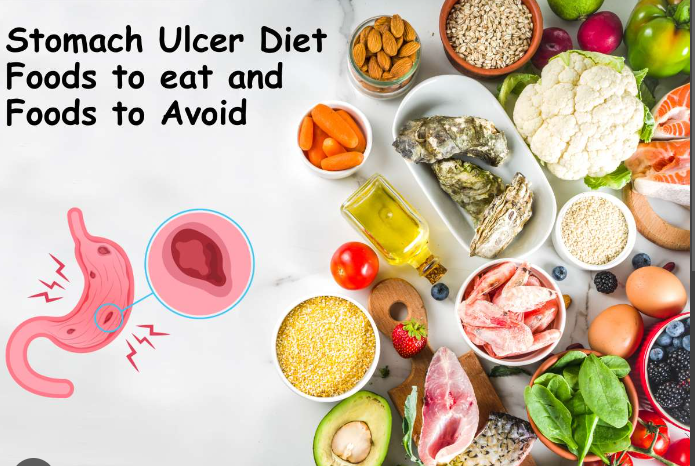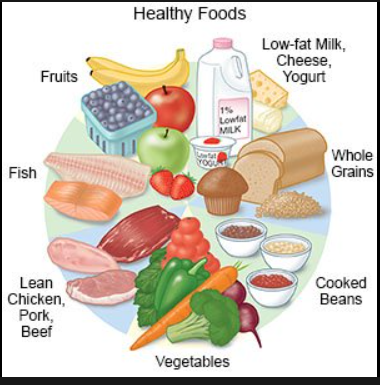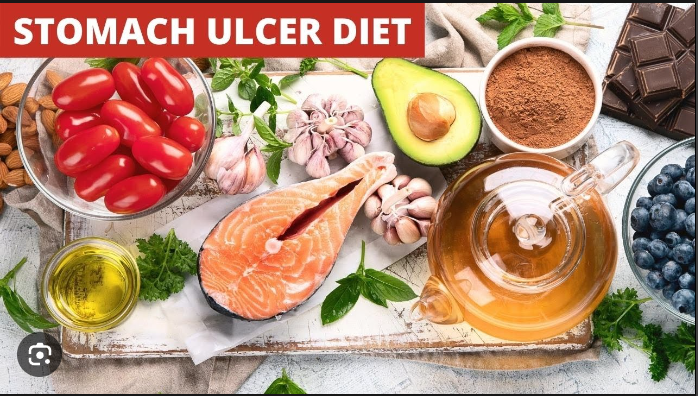Understand the role that an ulcer diet plays in managing peptic ulcers by learning about the foods that should be included and avoided in a diet for stomach ulcers.
If you’re like most people, you most likely ponder what to eat for part of the day. You may find this general mulling more difficult if you have a digestive health problem, like stomach ulcers. Peptic ulcers, another name for stomach ulcers, are sores in the lining of the stomach that can cause pain and discomfort in the abdomen as well as internal bleeding so we follow the ulcer diet

Also read-The Warrior Diet: Everything You Need To Know For Healthy Life And
ulcer diet
It might take some work to find the best diet for stomach ulcers, but there are some tactics you can try. You can determine which foods to prioritize and avoid by using an elimination diet, which involves cutting certain foods out of your diet and gradually reintroducing them to see if there are any problems.
What is an ulcer diet?
To help with healing and to reduce the symptoms of stomach ulcers, your doctor might advise dietary changes. However, what specifically ought to be served depends on what personally sets off your symptoms.

ulcer diet
According to Dr. Robert Lerrigo, associate chief of gastroenterology and hepatology at Santa Clara Valley Medical Center in California, “there is no specific diet that is recommended by the American Gastroenterological Association or American College of Gastroenterology to promote stomach ulcer healing.” “There have been several international studies suggesting certain foods may be helpful, but without larger trials in humans, one cannot definitively say for sure.”
Foods to eat and avoid when you have an ulcer
Olivia Vaughn, a registered dietitian at the Ohio State University Wexner Medical Center in Columbus, says that while there isn’t much evidence that certain foods and beverages can specifically cause or worsen ulcers, they can upset your stomach or increase the production of stomach acid. Still, be mindful of how your body responds because certain foods and drinks may aggravate your stomach. Consider food that is spicy.

ulcer diet
“Everyone immediately goes for spicy food (as a means of elimination),” says Florida-based family physician Dr. Thomas R. Kelley of Orlando Health. The intriguing thing about that, though, is that it’s not always the case. You have to test it on yourself; if spicy food upsets your stomach, stay away from that specific dish. However, it’s not necessarily off-limits.
The worst foods to eat
Commonly avoided foods and beverages include:
- Alcohol.
- Acidic foods like pineapple.
- Citrus fruits.
- Spicy foods.
- Fatty or greasy foods
- Pepper, including black pepper and other types of peppers.
- Caffeine, including caffeinated sodas
- Tea, including black and green varieties, contains tannins, which can increase the production of stomach acid.
- Coffee, including decaf
- Mint, including peppermint and spearmint
- Spearmint.
- Chocolate.
- Carbonated beverages.
- Raw vegetables or salads.
- Tomatoes.
The best foods to eat
Polyphenols, which are compounds found in fruits and vegetables and which support brain health and digestion, among other things, may be one of the most important components of your diet. Although research in this field is still in its early stages, Lerrigo cites a 2015 analysis of pre-clinical studies that indicates dietary polyphenols’ antioxidant qualities may promote gut health. (Antioxidants are thought to offer protection against a variety of diseases and can lower inflammation.)
How does an ulcer diet work?
Core emphasizes that there is no special diet to follow in order to treat a peptic ulcer.
Finding the foods that are best for you is what you can do. As previously mentioned, stay away from foods that worsen symptoms, such as those that increase the production of stomach acid. Second, give foods high in fiber, alkalinity, and antioxidants priority. These foods can reduce the production of acid and aid in the healing process. These two actions can promote general health and aid in the management of symptoms.

Probiotics, the “good” bacteria that encourage the development of beneficial gut flora, can also be very effective in reducing the risk of H. pylori infection, which is one of the main causes of peptic ulcers. For example, an increasing amount of evidence suggests that fermented foods such as those mentioned above may suppress H. pylori.
Probiotics have been demonstrated in recent research to reduce the colonization and burden of H. pylori infection, according to gastroenterologist and medical director Dr. Kaunteya Reddy of Redlands Community Hospital in Redlands, California. Therefore, consuming any food high in probiotics, like yogurt, aids in the healing process.

Remember that there is limited evidence supporting the benefits of probiotic supplements, even though science is still working to fully understand the relationship between the gut microbiome and health. Additionally, only the use of supplements to treat H. pylori bacterial infections is supported by this evidence. On the other hand, some probiotic strains may lessen the diarrhea brought on by the antibiotics used to treat H. pylori.
Sabat adds that staying hydrated, getting enough sleep, and controlling stress can all promote healing.
Also read-Exercise: Expert-Approved Tips To Make Exercise A Habit For Healthy Body
Disclaimer: The opinions and suggestions expressed in this article are solely those of the individual analysts. These are not the opinions of HNN. For more, please consult with your doctor.
images source: Google



































